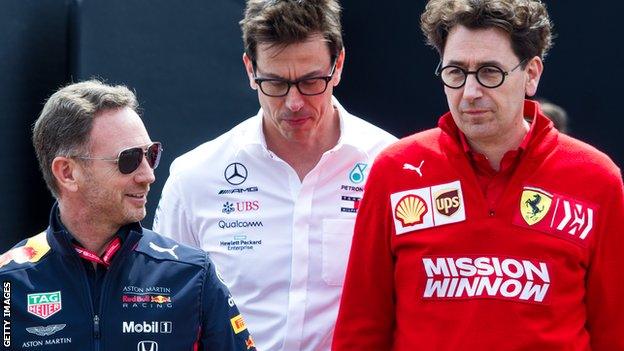Coronavirus: F1 teams agree to explore budget cap further after crisis meeting
- Published

The F1 season will only count as an official championship if it consists of eight or more races
Formula 1 bosses ended their crisis meeting on Monday with an agreement to look further into the issues around lowering a budget cap.
Teams had agreed to cut the 2021 cap - set at $175m or £135.9m - to $150m because of financial problems caused by coronavirus.
But at the meeting, the top three teams pushed back on a proposal to reduce the cap further to $125m.
And a bid to delay new rules by a further year to 2023 was rejected.
What happened with the budget cap?
Before meeting, McLaren boss Zak Brown had warned in a BBC Sport interview that F1 was "in a very fragile state" and it was imperative to reduce the budget cap to around $125m to ward off the threat of teams quitting the sport.
But during the course of a five-hour discussion involving team bosses, FIA president Jean Todt and F1 chairman Chase Carey, it was agreed that the complexities of the issue had not been fully considered.
Ferrari raised the point that a single figure for all teams was not fair and equitable because many of the smaller teams buy parts from the bigger teams.
In that event, Ferrari argued, the bigger teams are essentially disadvantaged because they are footing the research and development costs of those parts, a cost the smaller teams who buy them do not have.
The issue is further complicated by the fact that the customer teams all work to different models.
Haas, for example, buy every part other than the monocoque and aerodynamic surfaces from Ferrari.
Racing Point buy effectively the whole rear end of their car from Mercedes, while Williams just purchase an engine.
Ferrari and Red Bull are said to be determined for the cap not to be lower than $150m, whereas Mercedes are willing to go below that figure if the outcome is based on a holistic view of real cost saving and not competitive opportunism of some teams trying to peg back others.
There is also a move for a limit to be introduced on engine costs, which at the moment is one of the areas outside the budget cap.
Bosses agreed to reconvene for another meeting in a few days' time.
One possibility is that the issue is resolved by the sport ending up with one, higher, budget cap for the big teams to recognise their R&D cost and a lower one for the customer teams, perhaps even a sliding scale.
Ferrari also said at the meeting that a budget cap figure lower than $150m would force them to make large-scale redundancies, which is problematic under Italian employment law.
Because the $175m cap is already enshrined in the regulations, it has a fixed conversion rate in both pounds and euros. The revised and proposed caps do not.
No more rules delay - for now
The major rules change for 2021 which seeks to introduce cars that will create closer, more competitive racing was delayed last month by a year to 2022 to reduce costs.
Red Bull had been keen for that to be delayed by a further year to 2023 but FIA president Todt was adamant that should not happen.
It was agreed that the matter would be discussed again - but not until the summer, as it was not an urgent topic in the context of costs that need to be cut right now to assist teams with loss of income.
When might racing resume?
The coronavirus crisis has caused the first eight grands prix of 2020 to be called off and more postponements are expected this month.
Carey has said that he hopes to start a reconfigured season of 15-18 races at some point in the summer but the spread of the virus leaves the sport in an uncertain situation.
F1 bosses are now looking seriously at the option of holding races behind closed doors as a way to get the season going before social distancing restrictions are lifted.
It is hoped that the actions of societies across Europe will lead to the coronavirus situation to improve sufficiently for a number of closed-door events to be held starting in July or August, perhaps kicking off with the British Grand Prix at Silverstone, which has been singled out as a workable starting venue as seven of the 10 teams are based in this country.